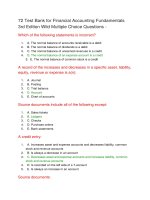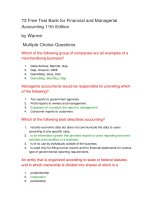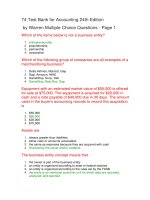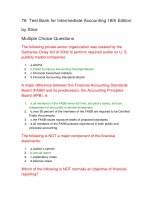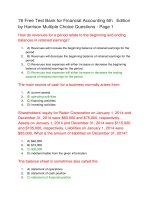71 test bank for intermediate accounting 5th edition đề trắc nghiệm có đáp án
Bạn đang xem bản rút gọn của tài liệu. Xem và tải ngay bản đầy đủ của tài liệu tại đây (85.99 KB, 16 trang )
71 Test Bank for Intermediate Accounting 5th Edition
by Spiceland
Multiple Choice Questions
The FASB's conceptual framework's qualitative characteristics of
accounting information include:
1.
A. Full disclosure.
2.
B. Relevance.
3.
C. Going concern.
4.
D. Historical cost.
The International Accounting Standards Board:
1.
A. Was the predecessor to the IASC.
2.
B. Can overrule the FASB when their policies disagree.
3.
4.
C. Promotes the use of high-quality, understandable global accounting
standards.
D. Has its headquarters in Geneva.
The full disclosure principle requires a balance between:
1.
A. Comparability and consistency.
2.
B. Relevance and cost effectiveness.
3.
C. Reliability and neutrality.
4.
D. Timeliness and predictive value.
The primary historical reason for the FASB reversing its positions
when political pressures occur is:
1.
A. The cost gathering data was prohibitive.
2.
B. The difficulties in measurement were too great.
3.
C. They have no authority in such situations.
4.
D. The SEC did not support the FASB position.
Which of the following is not a provision of the Public Company
Accounting Reform and Investor Protection Act of 2002?
1.
A. Corporate executive accountability.
2.
B. Auditor rotation.
3.
C. Retention of workpapers.
4.
D. All of these are provisions of the Act.
A firm's comprehensive income is always:
1.
A. The same as its net income.
2.
B. Greater than its net income.
3.
C. Less than its net income.
4.
D. Could be greater than or less than net income.
SFAC No.1 focuses on:
1.
A. Objectives of financial reporting.
2.
B. Qualitative characteristics of accounting information.
3.
C. Recognition and measurement concepts in accounting.
4.
D. Elements of financial statements.
Which of the following has the authority to set accounting
standards in the United States?
1.
A. FASB
2.
B. IRS
3.
C. SEC
4.
D. AICPA
The most recent example of the political process at work in
standard setting is the heated debate that occurred on the issue
of:
1.
A. Pension plan accounting.
2.
B. Accounting for posteretirement benefits other than pensions.
3.
C. Accounting for business combinations.
4.
D. Accounting for stock-based compensation.
The conceptual framework's recognition and measurement
concepts recognize which of the following as a principle, rather
than an assumption?
1.
A. Periodicity.
2.
B. Monetary unit.
3.
C. Conservatism.
4.
D. Full disclosure.
Financial accounting information should provide information
about:
1.
A. Resources of an enterprise.
2.
B. Claims to resources.
3.
C. The effects of transactions that cause changes in resources.
4.
D. All of these.
Which of the following is not true about net operating cash flow?
1.
A. It is the difference between cash receipts and cash disbursements from
providing goods and services.
2.
B. It is a measure used in accrual accounting and is recognized as the best
predictor of future operating cash flows.
3.
C. Over short periods of time, it may not be indicative of long-run cashgenerating ability.
4.
D. It is easy to understand and all information required to measure it is
factual.
Which of the following groups is not among financial
intermediaries?
1.
A. Mutual fund managers
2.
B. Financial analysts
3.
C. CPAs
4.
D. Credit rating organizations
When a registrant company submits its annual filing to the SEC, it
uses:
1.
A. Form 10-A.
2.
B. Form 10-K.
3.
C. Form 10-Q.
4.
D. Form S-1.
External decision makers would not look primarily to financial
accounting information to assist them in making decisions on:
1.
A. Granting credit.
2.
B. Capital budgeting.
3.
C. Selecting stocks.
4.
D. Mergers and acquisitions.
The FASB's conceptual framework's qualitative characteristics of
accounting information include:
1.
A. Historical cost.
2.
B. Realization.
3.
C. Reliability.
4.
D. Full disclosure.
Which of the following does not apply to secondary markets?
1.
A. Transactions are important to the efficient allocation of resources in our
economy.
2.
B. New resources are provided when shares of stock are sold by the
corporation to the initial owners.
3.
C. Transactions help to establish market prices for additional shares that
may be issued in the future.
4.
D. Many investors might be unwilling to provide resources to corporations if
there is no available mechanism for the future sale of their stocks and bonds
to others.
The primary professional organization for those accountants
working in industry is the:
1.
A. AAA
2.
B. AICPA
3.
C. IIA
4.
D. IMA
The FASB issues a Statement of Accounting Standards if
_________ FASB members support it.
1.
A. 5 of 9
2.
B. 5 of 7
3.
C. 4 of 7
4.
D. None of these is correct.
Pronouncements issued by the Committee on Accounting
Procedures:
1.
A. Dealt with specific accounting and reporting problems.
2.
B. Were based on exposure drafts and public comment letters.
3.
C. Originated from congressional studies and SEC directives.
4.
D. Were the outcome of research studies and a theoretical framework.
CPAs are licensed by:
1.
A. The AICPA.
2.
B. The SEC.
3.
C. The federal government.
4.
D. State governments.
GAAP is an abbreviation for:
1.
A. Generally authorized accounting procedures.
2.
B. Generally applied accounting procedures.
3.
C. Generally accepted auditing practices.
4.
D. Generally accepted accounting principles.
Which of the following is not a provision of the Public Company
Accounting Reform and Investor Protection Act of 2002
(Sarbanes-Oxley)? The Act
1.
A. Changed the entity responsible for setting auditing standards.
2.
B. Increased corporate executive responsibility for financial statements.
3.
C. Limited nonaudit services that can be performed by auditors for audit
clients.
4.
D. Changed the entity responsible for setting accounting standards.
The SEC issues accounting standards in the form of:
1.
A. Accounting Research Bulletins.
2.
B. Financial Reporting Releases.
3.
C. Financial Accounting Standards.
4.
D. Financial Technical Bulletins.
The most likely important flaw leading to the demise of the APB
was the perceived lack of:
1.
A. Confidence.
2.
B. Competence.
3.
C. Independence.
4.
D. Importance.
The conceptual framework's recognition and measurement
concepts recognize which of the following as an assumption,
rather than a principle?
1.
A. Going concern.
2.
B. Historical cost.
3.
C. Full disclosure.
4.
D. Realization.
The conceptual framework's qualitative characteristic of relevance
includes:
1.
A. Timeliness.
2.
B. Verifiability.
3.
C. Representational faithfulness.
4.
D. Neutrality.
In a recent annual report, Apple Computer reported the following
in one of its disclosure notes: "Warranty Expense: The Company
provides currently for the estimated cost for product warranties at
the time the related revenue is recognized." This note exemplifies
Apple's use of:
1.
A. Conservatism
2.
B. The matching principle
3.
C. Realization principle
4.
D. Full disclosure principle
The conceptual framework's qualitative characteristic of reliability
includes:
1.
A. Predictive value.
2.
B. Neutrality.
3.
C. Feedback value.
4.
D. Timeliness.
Which of the following groups is not among the external users for
whom financial statements are prepared?
1.
A. Customers
2.
B. Suppliers
3.
C. Employees
4.
D. All of these are external users of financial statements.
Accounting standard setting has been characterized as:
1.
A. A political process.
2.
B. Using the scientific method.
3.
C. Pure deductive reasoning.
4.
D. Pure inductive reasoning.
The FASB's standard-setting process includes, in the correct
order:
1.
A. Exposure draft, research, discussion memorandum, SFAS.
2.
B. Research, exposure draft, discussion memorandum, SFAS.
3.
C. Research, discussion memorandum, exposure draft, SFAS.
4.
D. Discussion memorandum, research, exposure draft, SFAS.
The recognition of which of the following expenses exemplifies
the application of the matching principle?
1.
A. President's salary.
2.
B. Research and development.
3.
C. Cost of goods sold.
4.
D. Advertising.
The most political issue in the FASB's most recent deliberations
and pronouncements on business combinations was:
1.
A. The negative effects on subsequent earnings of amortizing goodwill if
firms were required to use the purchase method of accounting for the
combination.
2.
B. The negative effects on subsequent earnings of amortizing goodwill if
firms were required to use the pooling method of accounting for the
combination.
3.
C. The unrealistic balance sheet assets that would be created if firms were
required to use the purchase method of accounting for the combination.
4.
D. The unrealistic balance sheet assets that would be created if firms were
required to use the pooling method of accounting for the combination.
Which of the following was the first private sector entity that set
accounting standards in the United States?
1.
A. Accounting Principles Board
2.
B. Committee on Accounting Procedure
3.
C. Financial Accounting Standards Board
4.
D. AICPA
A cause-and-effect relationship is implicit in the:
1.
A. Realization principle.
2.
B. Historical cost principle.
3.
C. Matching principle.
4.
D. Going concern assumption.
71 Free Test Bank for Intermediate Accounting 5th
Edition by Spiceland Multiple Choice Questions - Page
2
According to the conceptual framework, verifiability implies:
1.
A. Legal evidence.
2.
B. Logic.
3.
C. Consensus.
4.
D. Legal verdict.
Which of the following Statements of Financial Accounting
Concepts defines the 10 elements of financial statements?
1.
A. SFAC 1
2.
B. SFAC 2
3.
C. SFAC 5
4.
D. SFAC 6
Revenue should not be recognized until:
1.
A. The earnings process is complete and collection is reasonably assured.
2.
B. Contracts have been signed and payment has been received.
3.
C. Work has been performed and customer has been billed.
4.
D. Collection has been made and warrantees have expired.
Surefeet Corporation changed its inventory valuation method.
Which characteristic is jeopardized by this change?
1.
A. Comparability.
2.
B. Representational faithfulness.
3.
C. Consistency.
4.
D. Feedback value.
Independent auditors express an opinion on the:
1.
A. Fairness of financial statements.
2.
B. Accuracy of financial statements.
3.
C. Soundness of a company's future.
4.
D. Quality of a company's management.
Which of the following best demonstrates the full disclosure
principle:
1.
A. The multi-step income statement.
2.
B. The auditors' report.
3.
C. The company's tax return.
4.
D. Disclosure notes to financial statements.
The assumption that in the absence of contrary information a
business entity will continue indefinitely is the:
1.
A. Periodicity assumption.
2.
B. Entity assumption.
3.
C. Going concern assumption.
4.
D. Historical cost assumption.
Constraints on qualitative characteristics of accounting
information include:
1.
A. Timeliness.
2.
B. Going concern.
3.
C. Neutrality.
4.
D. Conservatism.
SFAC No.5 focuses on:
1.
A. Objectives of financial reporting.
2.
B. Qualitative characteristics of accounting information.
3.
C. Recognition and measurement concepts in accounting.
4.
D. Elements of financial statements.
Which of the following is not an identified valuation technique in
SFAS No. 157?
1.
A. Cost approach.
2.
B. Market approach.
3.
C. Cost-benefit approach.
4.
D. Income approach.
Elements of financial statements do not include:
1.
A. Monetary unit.
2.
B. Investments by owners.
3.
C. Comprehensive income.
4.
D. Losses.
Primecoat could get its annual financial statements two days
earlier if it shifted substantial human resources from other
operations to the annual report project. Management decided the
value of the earlier report was not worth the added commitment of
resources. The concept demonstrated is:
1.
A. Timeliness.
2.
B. Materiality.
3.
C. Relevance.
4.
D. Cost effectiveness.
Disclosure notes to a company's financial statements:
1.
A. Are relatively unimportant facts that don't belong in the basic financial
statements.
2.
B. Document the source of financial statement facts, like literary footnotes.
3.
C. Are an integral part of a company's financial statements.
4.
D. Are irrelevant facts that are immaterial in amount.
Primary qualitative characteristics of accounting information are:
1.
A. Relevance and comparability.
2.
B. Comparability and consistency.
3.
C. Reliability and relevance.
4.
D. Reliability and consistency.
Gains are:
1.
2.
A. Inflows from selling a product or service to a customer.
B. Increases in equity resulting from transfers of assets to the company
from owners.
3.
C. Increases in equity from peripheral transactions of an entity.
4.
D. None of these.
One of the elements that many believe distinguishes a profession
from other occupations is the acceptance by its members of a
responsibility for the interests of those it serves, often articulated
in:
1.
A. Its conceptual framework.
2.
B. Its code of ethics.
3.
C. Federal laws.
4.
D. State laws.
Secondary qualitative characteristics of accounting information
include:
1.
A. Relevance and comparability.
2.
B. Comparability and consistency.
3.
C. Reliability and relevance.
4.
D. Reliability and consistency.
Net income equals:
1.
A. Assets minus liabilities.
2.
B. Revenues minus cost of goods sold.
3.
C. Revenues minus expenses.
4.
D. Cash receipts minus cash payments.
Recognizing expected losses immediately, but deferring expected
gains, is an example of:
1.
A. Materiality.
2.
B. Conservatism.
3.
C. Cost effectiveness.
4.
D. Timeliness.
Financial reporting objectives do not include providing
information:
1.
A. About resources, obligations, and changes.
2.
B. To determine market values, assess profit potential, and evaluate
management.
3.
C. To assess the amounts and timing of prospective cash receipts.
4.
D. To make rational investment, credit, and similar decisions.
Mega Loan Company has very stringent credit requirements and,
accordingly, has negligible losses from uncollectible accounts.
The company's independent accountants did not protest when,
contrary to GAAP, the company recorded bad debt expense only
when specific accounts were determined to be uncollectible,
rather than use an allowance for uncollectible accounts. The
concept demonstrated is:
1.
A. Comparability.
2.
B. Representational faithfulness.
3.
C. Cost effectiveness.
4.
D. Materiality.
When there is agreement between a measure or description and
the phenomenon it purports to represent, information possesses
which characteristic?
1.
A. Verifiability.
2.
B. Predictive value.
3.
C. Representational faithfulness.
4.
D. Timeliness.
Land was acquired in 2009 for a future building site at a cost of
$40,000. The assessed valuation for tax purposes is $27,000, a
qualified appraiser placed its value at $48,000, and a recent firm
offer for the land was for a cash payment of $46,000. The land
should be reported in the financial statements at:
1.
A. $40,000.
2.
B. $27,000.
3.
C. $46,000.
4.
D. $48,000.
The main issue in the debate over accounting for employee stock
options was:
1.
A. Which employees should receive options.
2.
B. The amount of compensation expense that a company should recognize.
3.
C. How many options should be granted to key executives.
4.
D. The tax consequences of employee stock options.
Of the following, the most important objective for financial
reporting is to provide information useful for:
1.
A. Predicting cash flows.
2.
B. Determining taxable income.
3.
C. Providing accountability.
4.
D. Increasing future profits.
Maltec Corporation has started placing its quarterly financial
statements on its web page, thereby reducing by ten days the
time to get information to investors and creditors. The qualitative
concept improved is:
1.
A. Comparability.
2.
B. Consistency.
3.
C. Relevance.
4.
D. Reliability.
If an independent auditing firm expresses dissatisfaction with a
company's financial statements, it issues:
1.
A. A qualified opinion.
2.
B. An unqualified opinion.
3.
C. A disqualified opinion.
4.
D. A rejection of opinion.
The possibility that the capital markets' focus on periodic profits
may tempt a company's management to bend or even break
accounting rules to inflate reported net income is an example of:
1.
A. An ethical dilemma.
2.
B. An accounting theory issue.
3.
C. A technical accounting issue.
4.
D. None of these is correct.
If a company has gone bankrupt, its financial statements likely
violate:
1.
A. The matching principle.
2.
B. The realization principle.
3.
C. The stable monetary unit assumption.
4.
D. The going concern assumption.
Change in equity from nonowner sources is:
1.
A. Comprehensive income.
2.
B. Revenues.
3.
C. Expenses.
4.
D. Gains and losses.
Financial reporting objectives state that financial statements
should be comprehensible to
1.
2.
3.
4.
A. Accounting experts.
B. Those who have a reasonable understanding of business and economic
activities and are willing to study the information.
C. Large investors.
D. The average investor with average communication skills and average
training and experience.
Four different competent accountants independently agree on the
amount and method of reporting an economic event. The concept
demonstrated is:
1.
A. Reliability.
2.
B. Comparability.
3.
C. Representational faithfulness.
4.
D. Verifiability.
The best argument in support of historical cost information is:
1.
A. Relevance.
2.
B. Predictive quality for future cash flows.
3.
C. Materiality.
4.
D. Verifiability.
The matching principle is:
1.
A. A valuation method.
2.
B. An expense recognition accounting principle.
3.
C. A cash basis reporting principle.
4.
D. An asset classification procedure.
To meet the needs of full disclosure, companies use
supplemental information, including:
1.
A. Parenthetical comments or modifying comments placed on the face of
the financial statements.
2.
B. Disclosure notes conveying additional insights about company
operations, accounting principles, contractual agreements, and pending
litigation.
3.
C. Supplemental financial statements that report more detailed information
than is shown in the primary financial statements.
4.
D. All of these are correct.



